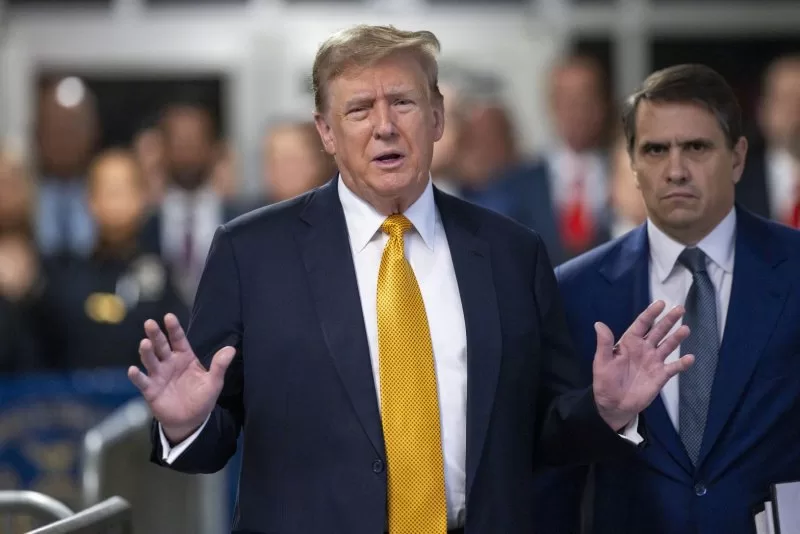at Manhattan Criminal Court in New York on May 21. Closing arguments are scheduled to start Tuesday in the felony trial charging Trump with making illegal hush-money payments to adult film actress Stormy Daniels in 2016. Pool photo by Justin Lane/UPI | License Photo
May 27 (UPI) — Closing arguments in former President Donald Trump‘s New York hush-money trial are set to begin Tuesday, one week after the defense rested its case and more than five weeks after the trial began.
Trump’s attorneys will present their closing arguments first, as they defend the former president against 34 felony charges. Prosecutors will then present their final statements alleging Trump falsified business documents to hide hush-money payments to adult film actress Stormy Daniels before the 2016 presidential election. Closing arguments are expected to take most of, if not all of Tuesday.
Once both the defense and prosecution have completed their closing arguments this week, Judge Juan Merchan will issue instructions to the jury of 12 New Yorkers as to what charges they can consider as they begin their deliberations.
Merchan ruled last week that jurors do not have to agree on an alleged crime — whether it’s a tax crime, violations of state law or violations of federal election law — that “predicated” the hush-money payment, despite defense protestations that jurors must agree in order to issue a felony conviction.
On Sunday, Trump blasted the judge in a post on Truth Social, claiming there is “no case.”
“The reason the radical, highly conflicted Judge Juan Merchan had to come up with three fake options for the jury to choose from, without requiring them to be unanimous, which is completely un-American and unconstitutional, is because the corrupt Soros-backed D.A., Alvin Bragg, couldn’t come close to proving that any crime was committed,” Trump wrote.
Over the course of the five-week trial, the prosecution called 20 witnesses — including Daniels and former Trump attorney Michael Cohen — totaling more than 50 hours. Trump’s defense team called two witnesses including a paralegal who entered phone records into evidence and Robert Costello, Cohen’s former attorney.
The former president did not testify.
Last week, Cohen testified he made a $130,000 payment to Daniels and also admitted he stole about $30,000 from the Trump Organization, saying he was angry Trump had shorted him on his bonus.
“I had protected Trump the best I could,” Cohen said during his nine-hour testimony. “And I also laid out money to RedFinch a year-and-a-half earlier, and again $130,000 payment to Daniels and to have my bonus cut by two-thirds was upsetting to say the least.”
Costello later testified that Cohen repeatedly told him Trump had no knowledge of any hush-money payments. At one point during his testimony, Merchan cleared the courtroom to admonish Costello.
“I want to discuss proper decorum in my courtroom,” Merchan said last week. “You don’t give me a side eye and you don’t roll your eyes. When there’s a witness on the stand, if you don’t like my ruling, you don’t say, ‘Jeez.’ You don’t say strike it.”
Earlier this month, Daniels testified under subpoena and described the alleged sexual encounter with Trump in a Lake Tahoe hotel room after meeting him at a celebrity golf tournament. Trump has denied the affair.
Daniels testified that the initial non-disclosure agreement with Trump was canceled when she was not paid, adding that a new deal was reached. Daniels testified that after legal fees, she took home about $96,000.
During cross-examination, Trump’s attorney Susan Necheles questioned Daniels about owing $122,000 in legal fees to Trump for defamation following a 9th Circuit Court of Appeals ruling last year. Daniels clarified she owes Trump about $560,000, saying she does not know if she will pay.
During Daniels’ testimony, the defense called for a mistrial and attempted to modify a gag order against Trump, arguing that Daniels’ detailed testimony about the alleged sexual encounter was not relevant. Merchan denied both motions.
While the jury is expected to get the case this week, there are three possible outcomes with no timetable for deliberations or a verdict: The jury could deadlock, forcing Merchan to declare a mistrial; the jury could find the prosecution did not make its case and acquit Trump; or the jury could convict the former president.
If convicted, Merchan could choose between sentencing Trump to probation or a sentence of up to four years on each count in state prison, with a maximum of 20 years.
